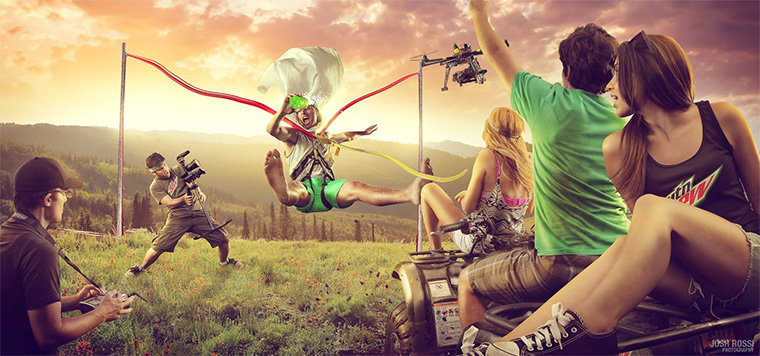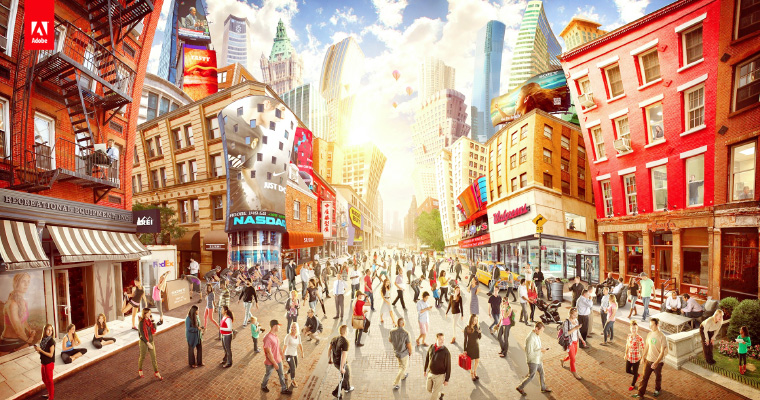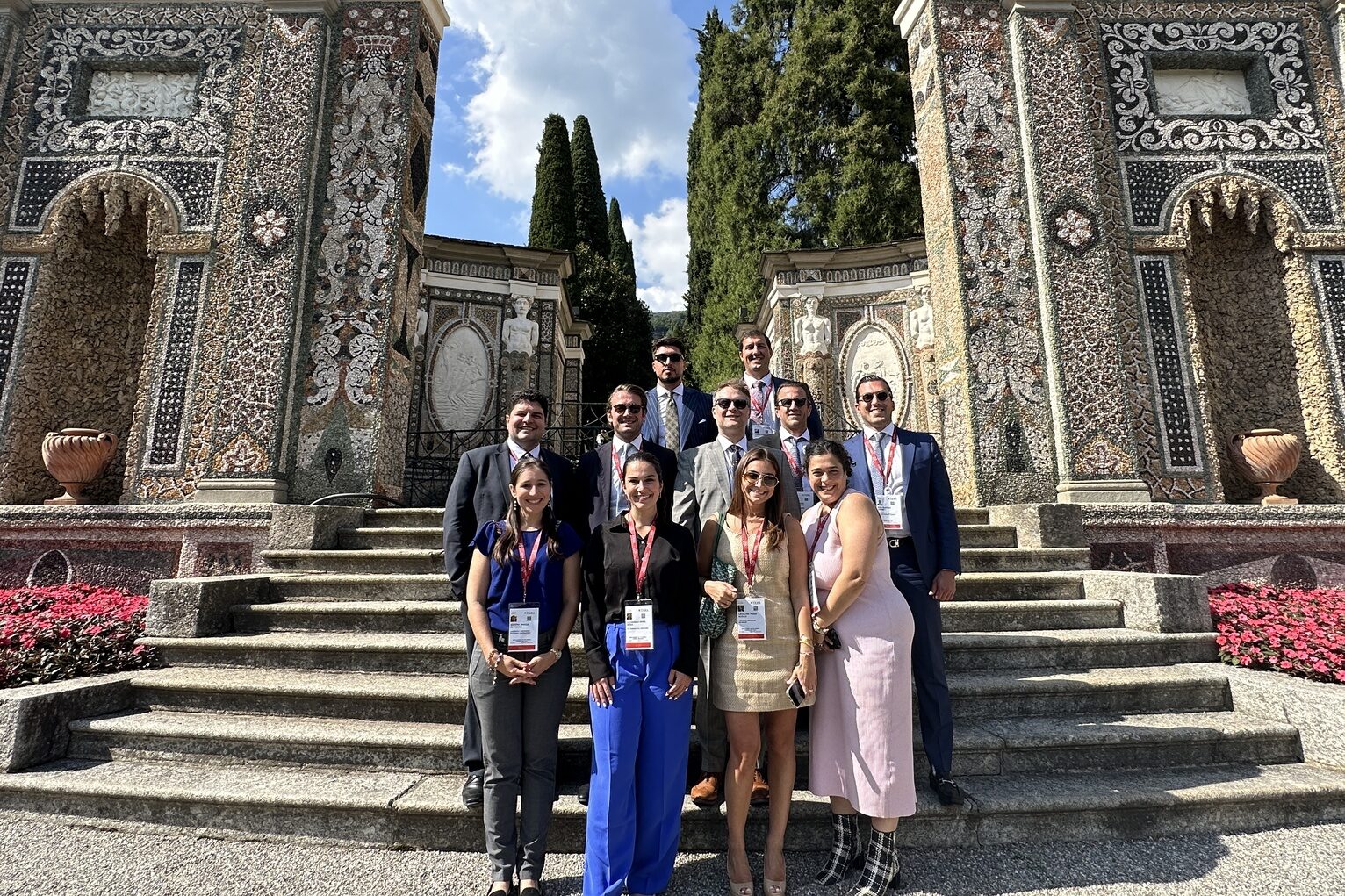Named one of the Top 200 Best Digital Artists Worldwide by Lürzer’s Archive, Josh Rossi is a blossom of Italian-American love.
“My parents met when my dad was 18 on vacation to the U.S. He was staying with a friend and had studied some English. His friend invited some American girls to the house and they started hanging out […] After getting married, my dad felt more comfortable doing business in his hometown so they moved back to Florence,” he writes.
This is how Rossi ended up being born in the Tuscan state capital, where he lived for the first 7 years of his life.
“I never felt like the transition [to the U.S] was difficult,” writes Rossi. “I already spoke fluent English because of my mom.”
Rossi shows deep Italian connections as he still uses olive oil instead of butter and cooks on the stove instead of using the microwave to warm up frozen meals. Though, his dad is a chef too.
While asking him what makes him stand out from the rest, Rossi writes, “I think it is not only the work I produce but the way I market myself. A lot of photographers are stuck in old mindsets and have been doing the same marketing that has been done for the past 20 years.”
Rossi has a black-and-orange mobile office that allows him to drive around and catch clients’ eyes. The inspiration, he said, came from his dad that once called him to share the trend that was going on in the East Coast of having mobile stores.
“I decided to try it out, but with my photo business,” Rossi writes. “Not many people have done that before so I thought it would be unique and get me attention.”
Looking at his list of clients, Rossi definitely got attention.
From Adobe to The Color Run, the artist has a lot on his plate. Currently, he is working on a big project with Daymond John from Shark Tank. “He will be hanging out a helicopter on the top of a sky scraper,” writes Rossi adding he couldn’t reveal further details at that point.
Lavinia Pisani: What is your take away from being born in Italy that you carry with you and probably wouldn’t if you were born in the U.S. instead?
Josh Rossi: My take away from being born in Italy is the fact that I have been exposed not only to the Italian culture but I have been open to many different cultures. I definitely was not born in a bubble and I love that. Not to say that I would have been in a bubble if born in the U.S. I don’t have much culture shock going to other places in the world and I love meeting new people. I have been exposed to some of the best food in the world and it keeps [making] me dream. If it weren’t for Italy, I probably wouldn’t be such a dreamer.

L.P: What do you like about Italian culture?
J.R: What I love about the culture is how passionate the people are. I get extremely passionate about certain projects and as a result the projects portray the emotion behind them. I also love that I come from an entrepreneurial background. Italians will make anything work no matter what. I also love the art history that steams from my city of Florence. I almost feel more entitled to be an artist because that is my hometown.
L.P: What is that you would want to pass along to your kids and future generations about this culture?
J.R: I would like to pass along absolutely everything from the cuisine to the language. I think there is a lot of pride in being Italian especially in our day now.
L.P: Tell me about when and how you decided to pursue your dream as a photographer, the initial struggles and what led you to become a successful one.
J.R: My dad always wanted me to take over the family business of food and so I worked in the food industry and with him for many years. At some point I needed a change and knew I was meant for something different. I wasn’t being fulfilled creatively and so I studied my options and decided to go into advertising. I started off by going to an ad school in Miami and that is where I found my passion for photography. Instead of doing my advertising homework I would spend hours at night researching the best photographers in the industry. I ended up leaving ad school after 6 months to try out photography. After a few years of shooting weddings and other work I decided to take a swing at commercial and advertising photography. The main struggle that I had initially is that I didn’t know how the industry worked. I didn’t know what to charge clients. I didn’t know what they expected of me and so I was in the dark. No one taught that stuff. Because of that I have made it a goal to teach all I know about the industry to help others get in. After hiring a consultant and seeking out multiple mentors I started figuring out how it all worked. I then started landing bigger jobs and being able to book more work. Sometimes its not just about finding the work but it is about being able to book the job at the price you want. That is where most photographers get it wrong. They might book a lot of work but they are still making no money because they are stuck in the rat race.
L.P: As a commercial/ advertising photographer, how do you feel about the photojournalism industry where fellow photographers struggle to make a living out of their craft?
J.R: I think that if photographers would treat what they do as a business a lot of things would change. Supply and demand. The demand will always be changing. A good businessman will see where the demand is and change his strategy accordingly. There is a lot of money in the industry it is just a matter of finding where it is going. Companies still need photojournalistic images but it may not be for print anymore. Maybe it is for their Instagram feed or an email promotion they are sending out. Once a photographer starts understanding the needs of a company then they will be able to tap into that flow of cash.
L.P: What do you think about social media and the way this shapes photography and success?
J.R: I think it is a great way to get your work noticed. That is how I have booked a lot of work. Although most photographers do it wrong and spend years wasting their time by hitting the wrong audience. Once again if you don’t know industry standards or how to price you could be followed by millions on social media but never make much money.
L.P: During your webinar “How I went from $500 to $50k per image” you suggested not being the “starving artist”, what does that mean and why?
J.R: Who wants to be a starving artist…? A starving artist is someone who makes no money doing what they love. That is not a sustainable way of living or running a business. Aside from that if you make no money then you can’t keep doing what you love. Even if you are a hobbyist you still need money to fund your projects. So once again who would want to be doing something they love but not make money doing it. Doesn’t everyone wish to make money doing something they love. If you love what you do you will never work a day in your life.




























